Congratulations! You landed a phone interview. It's easy to start feeling nervous, but don't. We'll help you prepare for all the questions you may be asked during the call and share 15 phone interview tips so you can move on to the next stage!
You've put in all that time behind your computer tweaking your resume, editing your cover letter, and crafting the perfect application questions. You weren't expecting much, but then…
*DING*
A new email hits your inbox from a recruiter — they want to hop on the phone with you tomorrow to see if you're a good fit for the role and the team.
Things just got real, this is your chance!
Now you just have to find a way to stay cool, convey your value, and stand out from the dozens of other people who also landed the phone call. No pressure, right? It's just your dream job…
That's where this post comes in.
During my job search, I went on over 50 interviews at places like Google, Microsoft, and Twitter. I've also coached thousands of job seekers through their interview process here at Cultivated Culture. I used those opportunities to test different strategies with one goal in mind: to find the tactics that will significantly boost your chances of landing the job offer.
This article distills the 15 most effective phone interview tips I've found during that time. To keep things organized, I broke them down into three sections:
- 7 Tips To Help Prepare For Your Phone Interview
- What To Do 20 Minutes Before Your Call
- 2 Post-Interview Tips That Will Seal The Deal
If you follow the framework laid out in this post before your next phone interview, I guarantee you're landing a spot in the next round:
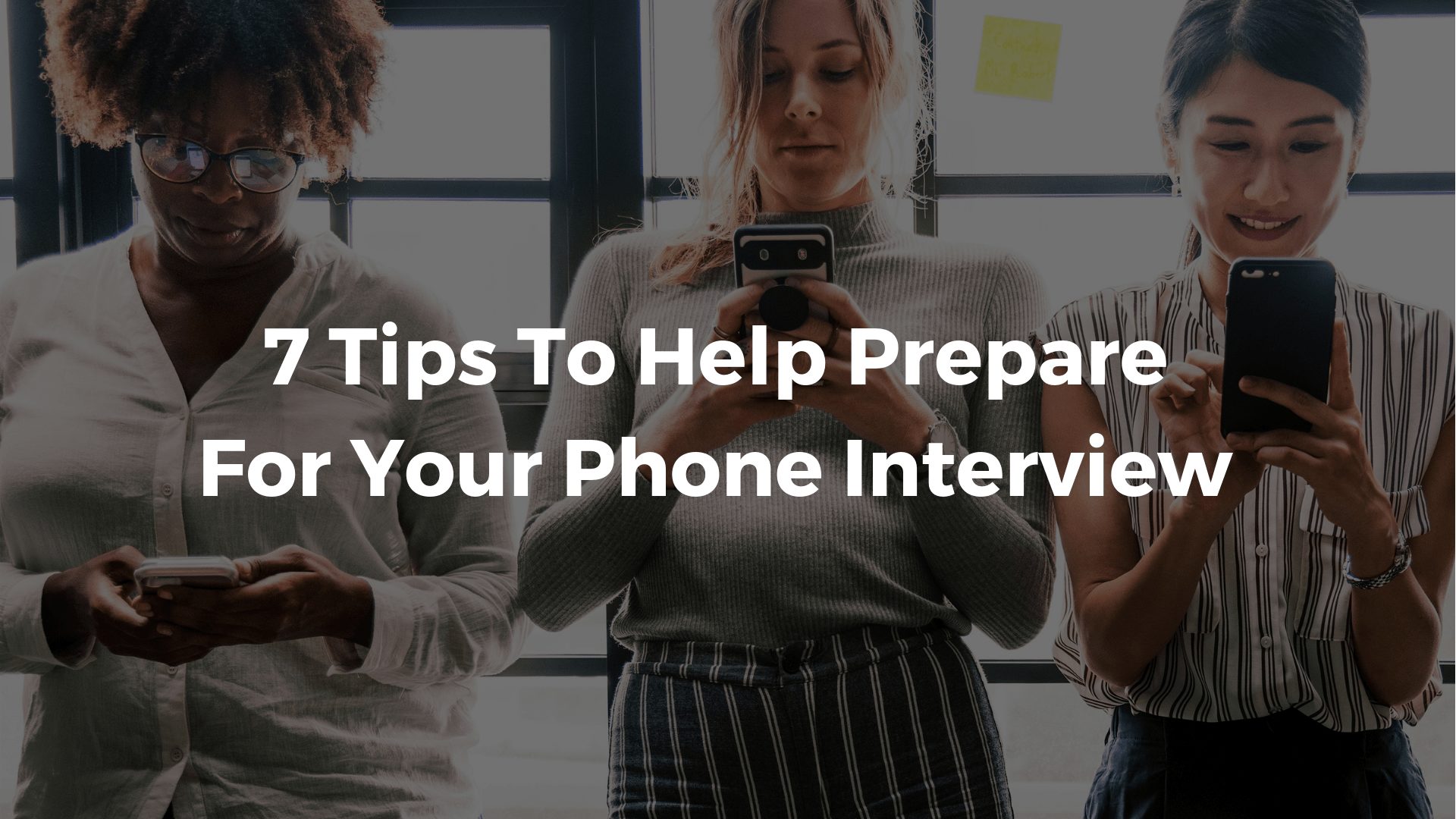
8 Tips To Help Prepare For Your Phone Interview
When it comes to interviewing, 80% of success lies in the preparation. Most job seekers know that it's important to prepare, but they have no idea how to prepare.
In this section, I'm going to walk you through eight interview prep tips that helped me triple the amount of job offers I received from phone interviews (at places like Google, Microsoft, & Twitter no less!).
Tip #1: Prepare & Memorize Answers To Common Phone Interview Questions
The easiest and most efficient way to become a better interviewer is to prepare for the obvious questions.
If you've been on multiple interviews, you've probably realized that many of the phone interview questions sound familiar. That's because most interviews are like a Taco Bell menu: the ingredients are the same, everything's just packaged differently.
One company might ask you about a time you failed while another might ask you about the most valuable lesson you learned at your last job. Both of those questions are essentially getting at the same thing, which means we can handle them with a single answer.
Between the 50+ interviews I sat through during my job search, the interviews I hear about from the 12,000+ people in the Cultivated Culture community, and the treasure trove of data on places like Glassdoor, I've been able to uncover the data behind the questions companies ask, and how often they appear.
It turns out that most interviews ask a variation of the same set of questions, with one or two wildcards thrown in for good measure. If we boil it down, 95% of interviews mainly consist of these seven questions:
7 Core Phone Interview Questions
- Why do you want to work for us?
- Tell me about a time you exhibited leadership
- Tell me about a time where you had to work as a team
- Tell me about a time you’ve had to work with a difficult person, or difficult people
- Tell me about a time you failed
- Tell me about a time you overcame an obstacle
- Tell me about a time when you had success
If you can prepare and memorize answers to those question, you can walk into almost any interview and succeed with no other preparation! You can do that by:
- Opening a Google Doc and writing down the first thing that comes to mind for each question
- Have a beer or a glass of wine and get a good night's sleep
- Wake up in the morning, read through your answers, and make edits
- Rehearse your answers at least two more that day (for a total of 3)
- Rinse and repeat steps 2-5 for seven consecutive days
For a detail breakdown of crafting great interview answers and a science-based “hack” to help you memorize them with minimal effort, check out this post.
Tip #2: Record Yourself Answering Each Question
Dr. Albert Mehrabian is a professor of psychology at UCLA who specializes in the way people communicate. According to his research, 7 % of our message is conveyed through words, 38% through vocal elements, and 55% through nonverbal elements (facial expressions, gestures, posture, etc.).
Crazy, right?
Phone interviews cut out 55% of the feedback our interviewers would normally use to absorb our message. That means you need to make the other 45% count if we want to make a positive impression that lasts.
After you've memorized your answers, record yourself delivering them (you can use QuickTime on a Mac or the Voice Recorder app on Windows). Then listen back to your answers and analyze how they came across:
- Do you sound confident?
- Are you rambling or stumbling over your words?
- Are “like,” “um,” or “uhhh” popping up every three words?
- Are you putting enough emphasis on the main points you want to get across?
By recording your answers and listening back, you'll hear exactly what the interviewer is going to hear so you can make sure you answers are clear, refined, and convey your message.
Tip #3: Research The Company, Especially Challenges & New Initiatives
When you're in the phone interview stage, efficiency is key. You'll probably be hearing back from several companies at once, all expecting you to show up prepared for a phone interview 24-48 hours later.
When your window is that short, you don't have time to read and absorb an entire company's history. Instead, you should be focusing on the pieces of information that matter: the current company status, challenges they're facing, and upcoming initiatives.
Here is a simple two step framework that will help you quickly absorb all of that info in less than an hour per company:
Step 1: Listen To Their Most Recent Earnings Call
Public companies have a responsibility to keep their shareholders up to date on earnings, challenges, and initiatives.
They do this by holding “earnings calls” or “shareholder meetings” on a regular cadence, usually once per quarter. The great news for us is that the companies record these meetings and share them publicly on their Investor Relations page so anyone can get in on the action. A quick Google search for [Company Name] Investor Relations or [Company Name] Earnings Call should get you what you're looking for:
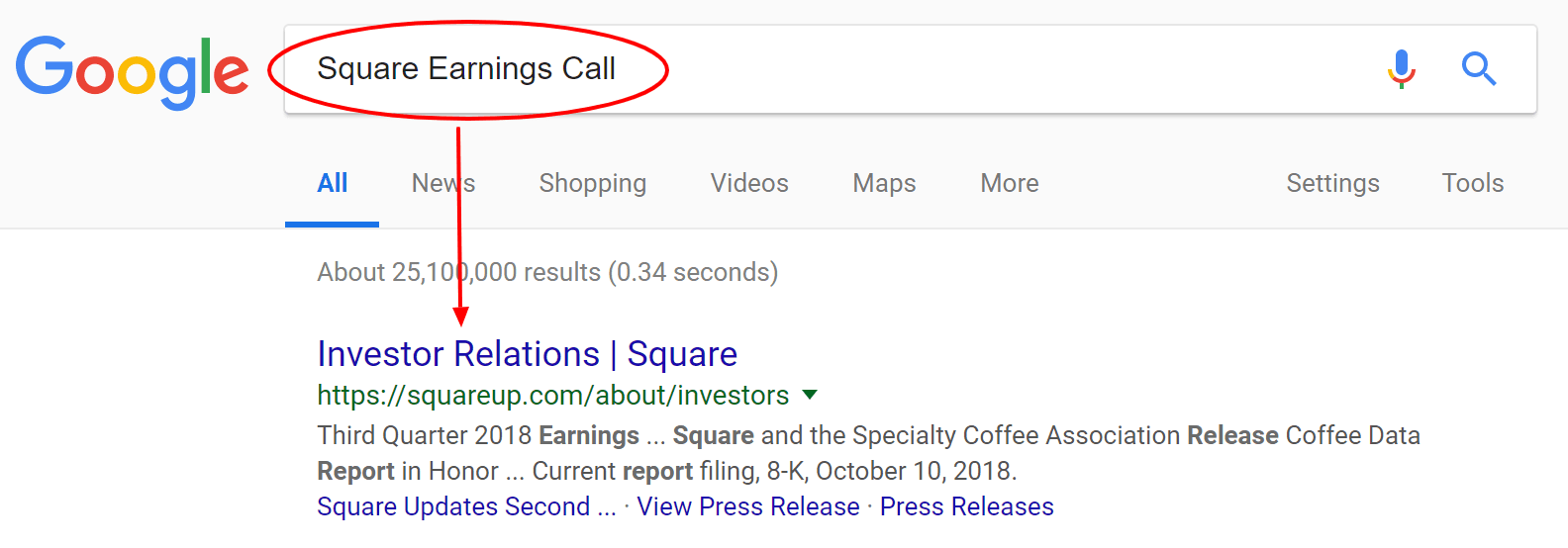
Using Square's Investor Relations page as an example, you'll find an audio recording of their quarterly earnings call as well as a letter to the shareholders summarizing their performance:
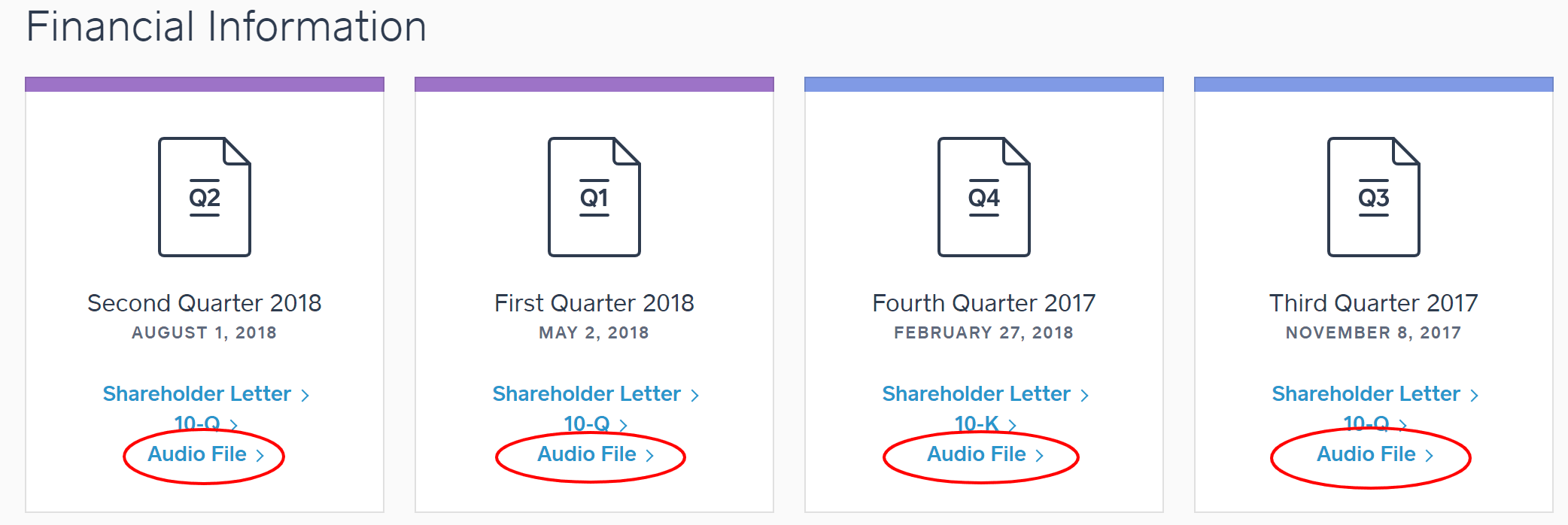
Their average call was around 50 minutes, but if you download the MP3, stick it into iTunes, and run it at 2x speed you'll be able to get through it in 25-30 minutes. That will give you an overview of why the company was successful (or not) over the previous quarter as well as how they're addressing major challenges and what they're planning to release in the near future.
Step 2: Read Trending Articles On Seeking Alpha
Seeking Alpha is a financial blog and analysis platform where experts from all different companies and philosophies come to share their insight on publicly traded companies.
I love this site because those analysts do all of the research for you and then distill it down into a quick read so you can suck up all the information without investing (pun intended) a ton of your time. All you need to do is search for your target company and their “profile” page will pop up with their current stock price, major news, and analysis:
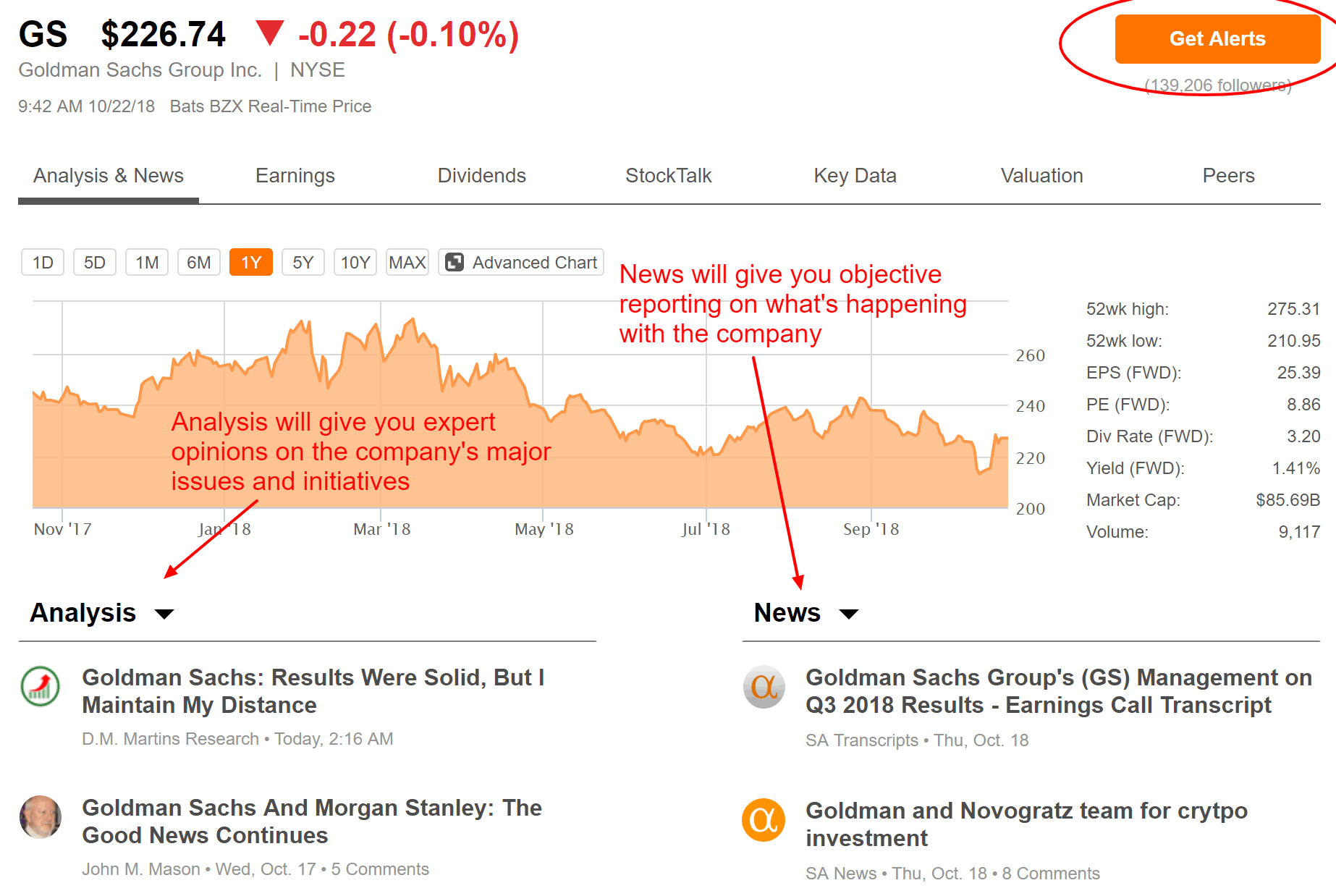
Reading the top five articles from both the News and Analysis section will give you a very solid idea of what the company is currently dealing with and how the short term future looks. If you have a few days before your interview, you can hit the Get Alerts button in the upper right hand corner and have a daily digest of the best articles sent to your email every morning. No need to seek out the info, it'll be delivered straight to you!
If you spend an hour of your time listening to the company's most recent earnings call and reading the top articles on Seeking Alpha, you should have all the info you need to make a great impression in your phone interview!
Tip #4: Research Your Interviewer
Now that you've got a solid handle on the company, it's time to take a deep dive into the person who's going to make or break your ability to work for them.
People tend to have a mental blocker around building relationships. Invisible scripts like “I'm not qualified,” “I get anxious talk to people and I can't be myself,” “I don't have anything to offer” prevent us from living up to our potential. The truth is, relationship building during interviews is actually pretty easy to do if you come prepared.
The person sitting across the table from you wants to like you. If you're a great fit and a cool person, their job is SO much easier. I'm about to share the secret to building a positive relationship with your interviewer in 5 minutes.
Ready?
First, dig up as much information as you possibly can. Here's my 5 step checklist for learning everything you can about who's conducting the phone interview in 15 minutes:
15 Minute Research Checklist
- Read through their LinkedIn profile and check to see if they have any recent posts or shares. If so, read those too.
- Check their Twitter profile and browse through the last few weeks of tweets.
- Hit up their Facebook profile / Instagram and check out the pictures from the last few weeks
- Google their name and see what comes up – have they been mentioned anywhere? Have they written any articles? Do they have a personal website?
- If they have a personal website, browse through that too
Those steps should give you an idea of who they are as a professional, what their career path looks like, and what their personal interests are.
For example, if you were interviewing at Microsoft for a Program Manager role, you might be interviewing with my colleague Dare. A quick Google shows us that he's passionate about politics, as well as the impact tech has on our government and society (it also shows that Twitter might be a great place to connect since he's so active there):
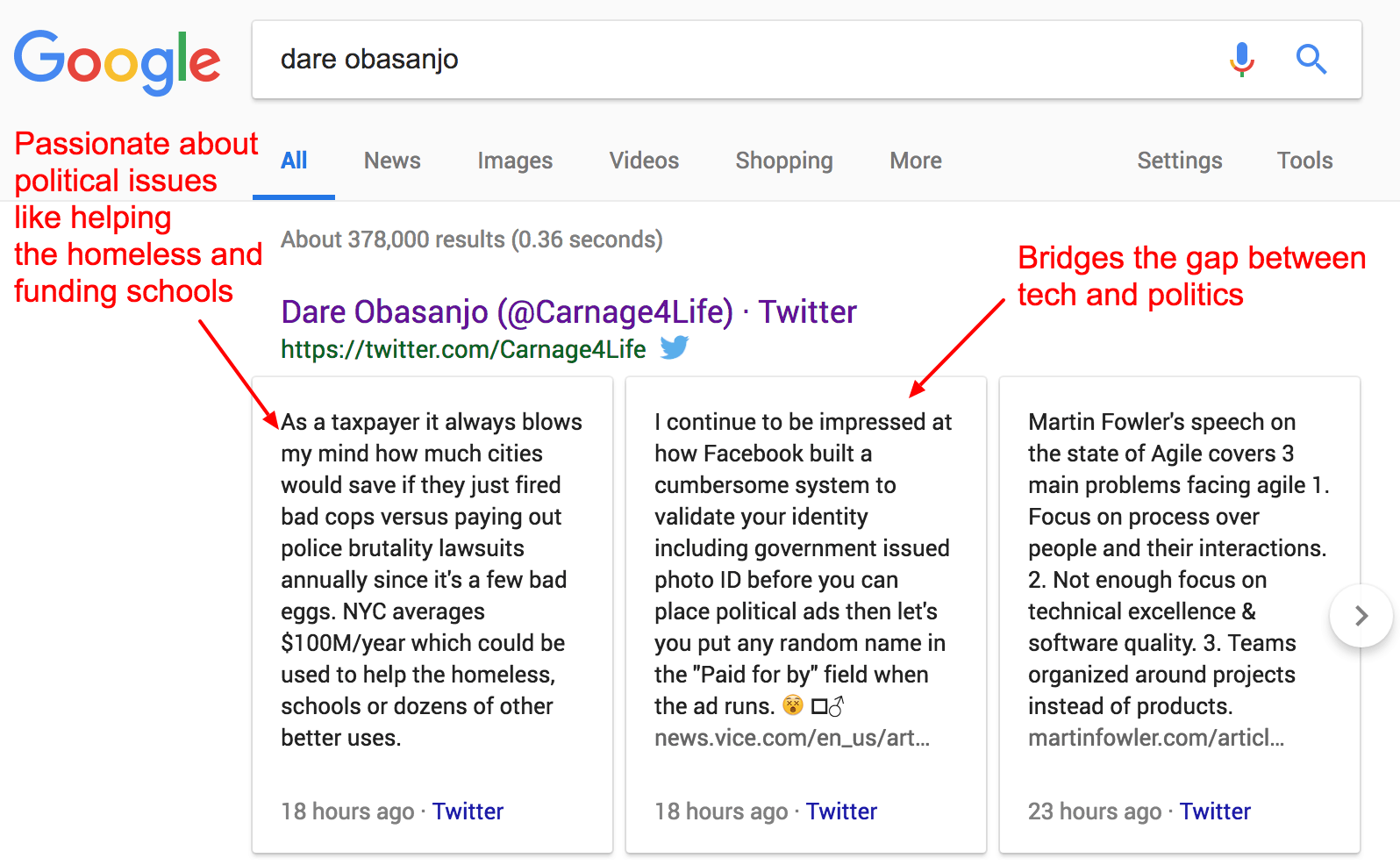
Scrolling down the results, we'd also see that Dare shares a lot of his thoughts on his Medium profile. Reading up on some of these posts is a great way to get inside of his head and understand where he's coming from:
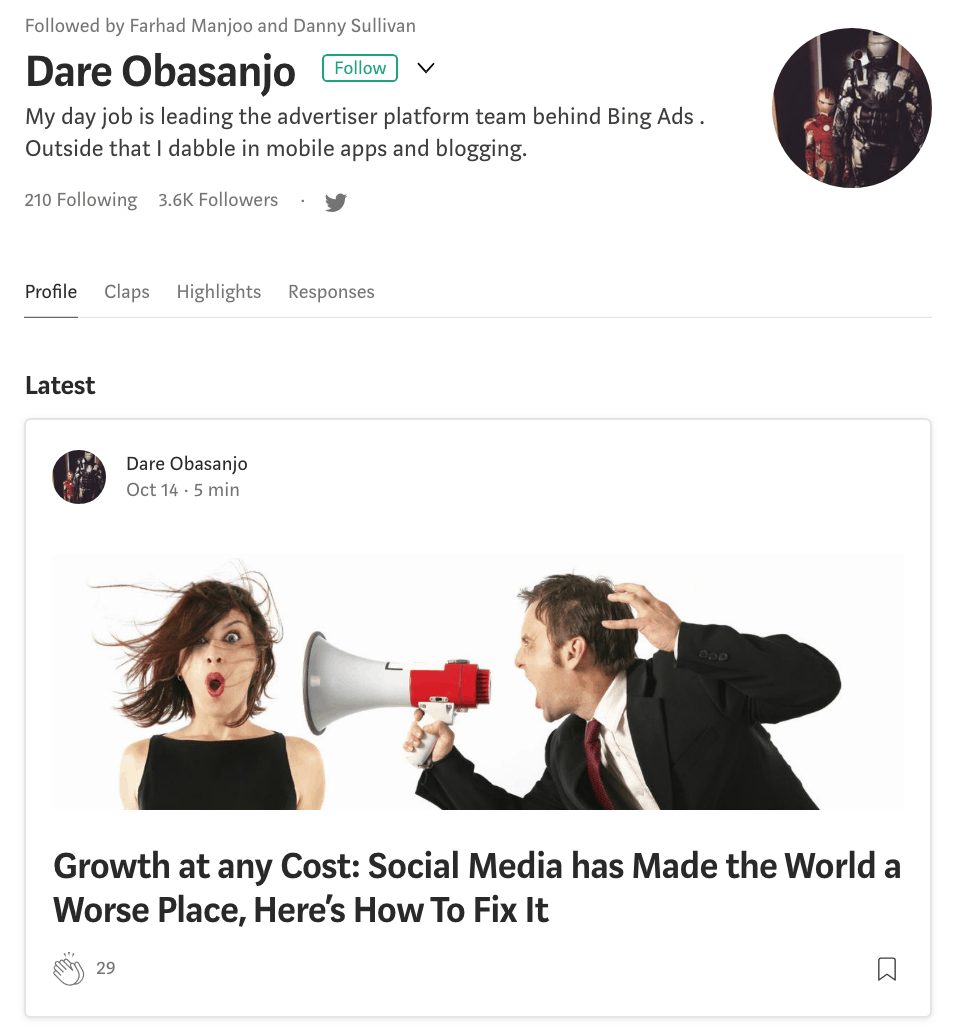
These are great angles you can use to make small talk, bring down the “professional barrier,” and build a rapport with your interviewer. Even if you're not “good” or comfortable with small talk, all you need to do is back the conversation into the topic, ask them about it, and continue with follow up questions!
Tip #5: Create A List Of Questions To Ask The Interviewer
Asking questions is one of the most important and underutilized parts of the phone interview.
Leading up to the Q&A, your interviewer has been controlling the conversation, and they've likely been asking the same questions to every candidate. That means they've been getting similar answers, within a range. Sure, some people will have better experience and are able to convey their value better, but the answers will be in the same vein.
The opportunity to ask questions is your chance to stand out and gain an edge over the competition.
During my job search, I went on 50+ interviews at dozens of companies. I used those opportunities to split test different interview questions and sets to see which were the most effective. Based on feedback and the result of the interview, I found that these 5 questions were the most effective:
Questions To Ask At The End Of Your Phone Interview
- What Is Your Favorite Part About Working For Company X?
- What Is The Biggest Challenge Your Team Is Facing Right Now?
- Let's Fast Forward One Year – You’re Looking Back On This Hire. What Did They Do To Exceed All Expectations?
- What Is The Most Unexpected Lesson You’ve Learned While Working At Company X?
- Tell Me A Little Bit More About You, What Do You Like To Do Outside Of Work?
There are specific, science-backed reasons around why these questions are so effective. To learn more about the principles behind them, along with a few psychology “hacks” you can use to boost your chances of landing a positive impression with your interviewer, give this article a read.
Tip #6: Research Salaries For This Position & Come Up With “Your Number”
This one is a doozie!
Tripping up on a question about “a time you failed” or “your career path” is one thing – there will be a chance to make up for it. Messing up the conversation about your salary expectations can kill your ability to negotiate down the road, which is exactly why interviewers LOVE to ask it early on.
The good news is that, with a little research and preparation, you can ace this interview question and turn it into a 20% raise at the end of the process, here's how: I've included the abbreviated version of making that happen below – for the full detailed walkthrough on negotiating your salary, check out this article:
Step #1: Know Your Worth
The internet makes it pretty easy to gauge what other people are being paid for similar positions. My three favorite sites for this are Glassdoor, Paysa, and Salary.com.
The best case scenario is finding a salary range for the exact role and company you want, but that's a rare jackpot. Alternatively, you can look at ranges for that job title in the city where you plan to work — here's the average for Project Managers in New York (via Glassdoor):
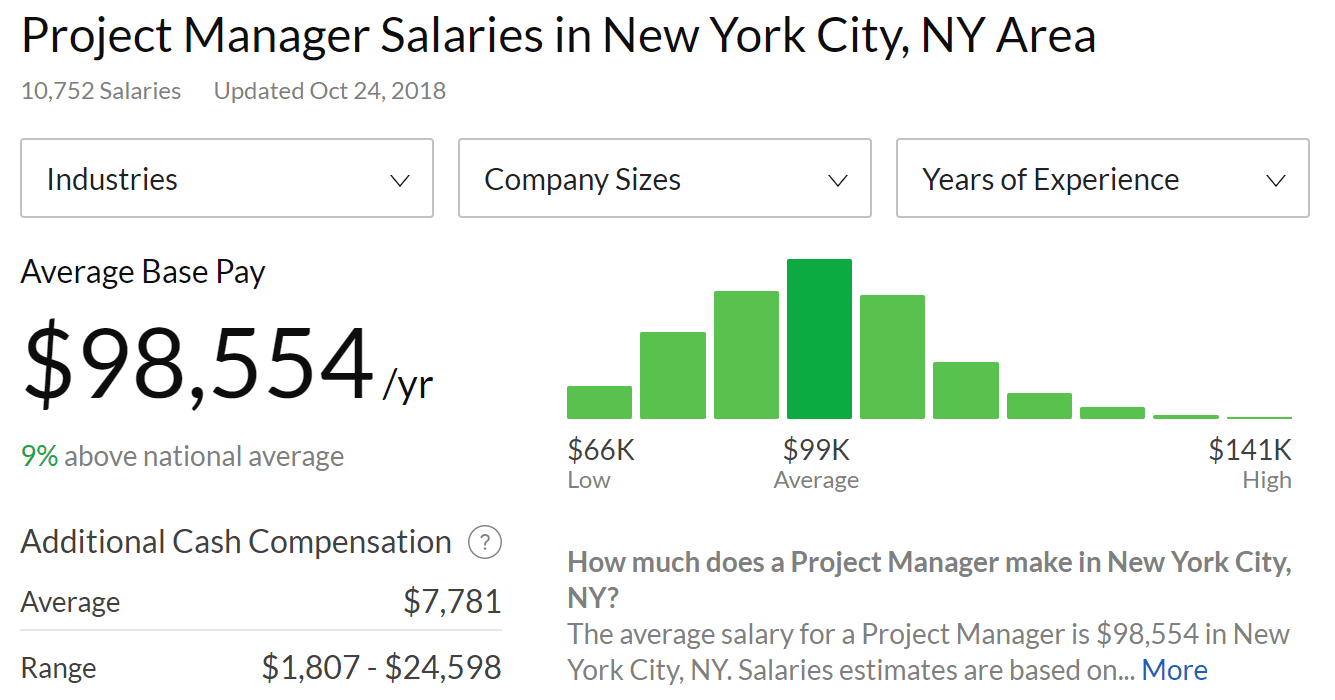
Or see what your target company's competitors are offering for similar positions. Let's say you wanted to work as a Creative Strategist at Twitter, but no one had submitted salaries on Glassdoor. You could use Paysa to look up the range for the same job title at Facebook:

You don't have to be scientifically accurate here, the goal is to get an idea of what's reasonable when it comes to compensation for your target position. If pushed, you want to be able to provide a figure in the upper range of the range you found. Here's how to handle that conversation:
Step #2: Preach Fit Over Money
The #1 rule of negotiating salary is that the first person to throw out a number ends up at a big disadvantage.
When your interviewer says “can you tell me a little bit more about your salary expectations?” or “can you tell me how much you made at your previous role?” don't immediately cave and give them the info they want. Instead, tell them that you're flexible on salary but finding the right fit is your #1 priority.
Handling The Salary Question In A Phone Interview
Interviewer: Can you give me an idea of your salary expectations for this role?
You: I am flexible on salary and compensation, my number one priority is making sure this is the right fit for both of us.
That should get you out of the limelight for the moment and buy you some time.
Step #7: Hit Them With 75%-80% Of The Upper Limit
At some point, you'll need to cough up a number.
Your interviewer might say “we don't move forward unless we have a firm number,” or you may have made it to the final round, or maybe they gave you an offer and it was a lowball!
In those cases, the best thing to do is give them a number that sits in the 75-80% range of the upper limit. Using our Project Manager role from the screenshot above, PMs make an average of $98k per year but the upper limit is $141k. 75% of $141k is $105K so that is your number!
Give it to them and see how they react.
Tip #8: Practice With Friends Or Family
Finally, one of the best things you can do to prepare is get a second opinion.
We all tend to be biased about our own abilities (for better or worse), having someone you trust running a mock interview can help you identify any additional weaknesses to shore up before the big day. Try to find someone objective who has some experience in the same industry as your target role.
Give them some background on the role, ask them to pick a few of the “core” questions (at random), and ask them to throw in a few curve balls to keep you on your toes. Do your best to treat this as if it were a real interview – do it over the phone, avoid any non-relevant small talk, and try to recreate the environment you're going to encounter during the real phone interview.
Preparation Complete!
If you follow all of the tips laid out above, you should be incredibly well prepared to crush your upcoming phone interview. But all that prep doesn't matter if you don't capitalize on it during the interview.
The next two sections will walk you through a few tips to help you set up the right environment, overcome nerves/anxiety, and help you make an impression that solidifies your spot in the next round.
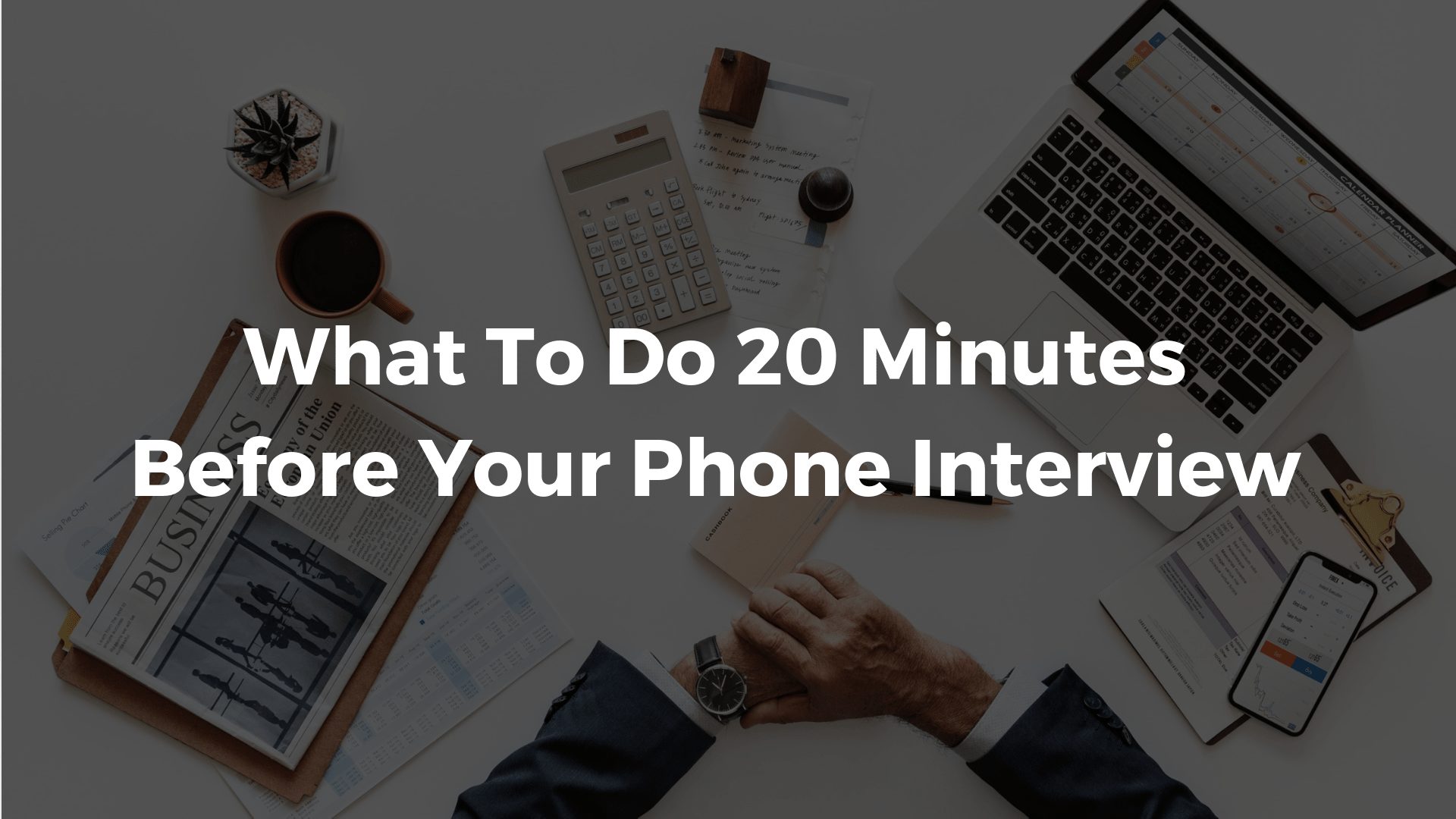
What To Do 20 Minutes Before Your Phone Interview (4 Tips)
I'll admit, these are fairly “obvious” but there's a reason everyone else talks about them – they work. Make sure you clear your schedule at least 15 minutes before your phone interview so you can get settled and get into the right mindset.
Tip #9: Find Somewhere Quiet
Background noise definitely does not leave a professional impression, and it can kill your ability to focus. You don't want a door slamming as your interviewer introduces themselves, or your coworker yelling F***K as you're explaining your biggest weakness.
Despite our best efforts, studies have proven that humans simply can't multi-task. Instead, your attention gets divided so you can only give a maximum of 50% if you're trying to focus on two things at once (and even less as you add more focal points).
You may think of multi-tasking as a conscious effort to text your friend while talking to your Mom on speakerphone, but it happens at the subconscious level as well. It's harder to come up with an answer on the fly when your brain is busy trying to block out background noise. Save yourself the trouble and find somewhere nice and quiet for your phone interview.
Tip #10: Use Headphones To Take The Call
This one is super easy – plug in your headphones and take your call using them. This frees up your hands to scroll through notes you have prepared and simply use them to speak (which actually helps you express your thoughts more effectively – even over the phone), bringing us to our next tip:
Tip #11: Have Important Resources Ready On Your Computer
While phone interviews kill our ability to include body language in our message, they give us the advantage of being able to have helpful resources right in front of us. My advice is to close out everything on your computer except for one browser with the following items open in different tabs:
- Your Resume
- The Job Description
- Your Interviewer's LinkedIn Profile
- The Questions You Want To Ask Your Interviewer
These resources will allow you to pull up any information you might need on the fly, which can save you if you have a brain fart or the interviewer catches you off guard with something.
Pro Tip: It sounds weird looking at a picture of your interviewer (e.g. their LinkedIn profile picture) can help you sound more natural on the phone. It's much easier for our brains to pretend we're in a conversation when we look at a picture vs. a Word doc.
Tip #12: Check Your Connection
Once you're set up in a quiet space with all of your resources pulled up, give a friend or family member a call. You should keep it short so you have time for the next tip, but you want to make sure that you can carry on a conversation without breaking up or any weird interference. It's rare, but you're better off taking two minutes to be safe than sorry.
Tip #13: Meditate
Whoa, like a monk!?
Exactly like a monk.
Meditation is an insanely powerful tool when it comes to gaining an edge in your phone interview. Its medically backed benefits – reducing stress, controlling anxiety, increased mental clarity, increased attention span, etc. – all directly correlate with better interview results. You can get all of these benefits in as little as 2-5 minutes of meditation.
It's not hard either. If you've never meditated before, all you need to do is follow this box breathing exercise for a few minutes:

Make sure to give yourself a minute or two before your interview to allow your breathing and your mental state to return to baseline. Now you're ready to pick up the phone, ace the phone interview, and take one step closer to your dream job!
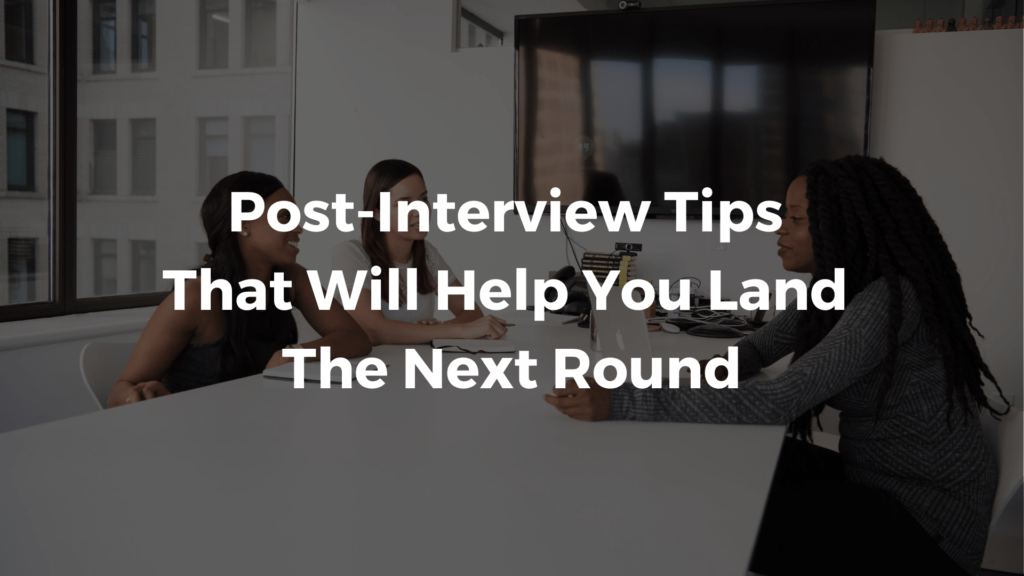
2 Post Phone Interview Actions That Will Help You Land The Next Round
Whew!
You hang up the phone and exhale all of that nervous energy – mission complete. Now it's out of your hands, you did everything you could, right?
Not so fast. The phone interview may be over but your chance to make an impression and set yourself apart from the other applicants isn't.
This section is critically important. Why? Because most candidates do a lot of the stuff we talked about above. They may not do it to the level of depth that I suggested, but they at least cover their bases.
The tips below are proven to have the largest impact on your chances of getting hired (according to the data I've collected on hundreds of job seekers):
Tip #14: Send A Thank You Note
Thanking people is common sense and common courtesy, right?
Turns out that only 24% of candidates actually send a thank you note. On top of that, data shows that close to 80% of hiring managers feel that thank you notes are helpful when deciding between candidates. 22% of employers are less likely to hire a candidate who does not send a thank you and 91% actually like being thanked (imagine that!).
Talk about low hanging fruit!
We don't just want to go one notch above the competition though. We want to squeeze everything we can out of this opportunity, which is why you shouldn't be writing a basic “thank you for your time.” You want to show that you listened, absorbed, and can contribute more.
I've written an entire article on how to do this effectively, you can read and download my copy/paste thank you template for free.
Tip #15: Prepare A Value Validation Project
Last, but not least, this is the most effective tool I can recommend for any job seeker: the Value Validation Project (VVP).
VVPs are essentially deliverables that highlight your value against a specific need that the company has. It could be solutions to a problem, ideas for an upcoming release, valuable feedback from their customers, or simply a chance to flex your skills in a way that gets noticed.
You can find an angle for your VVP a number of different ways.
Reading back through your research on the company is a great start, or leveraging the information your interviewer gave you around their biggest challenge is another. When all else fails, you can always go out and poll the company's customers (if anyone is going to give you brutally honest feedback, it's them).
Then you can build out a deliverable that highlights your value against that angle. Here's a great example of a VVP that helped someone in the Cultivated Culture community land a job at Airbnb:
Cam Identifies Customer Pain Points & Offers Solutions
Cam was a student looking to score a job at Airbnb.
She had applied online and blasted out emails to anyone she could find at Airbnb, but no one was biting. She was left with two choices: give up and move on or find a way to bring value that they couldn't ignore.
Cam doubled down and turned to Airbnb's user base.
She combed through social media logging all the complaints Airbnb's users share publicly, then she analyzed the data to identify two major problems:
- The lack of a keyword specific search (finding listings that specifically had “hot tubs” or “fireplaces” for example.
- How freaking hard it was to get in touch with someone from Airbnb's customer service team
Cam created a deck that highlighted those issues along with her two data-backed solutions:
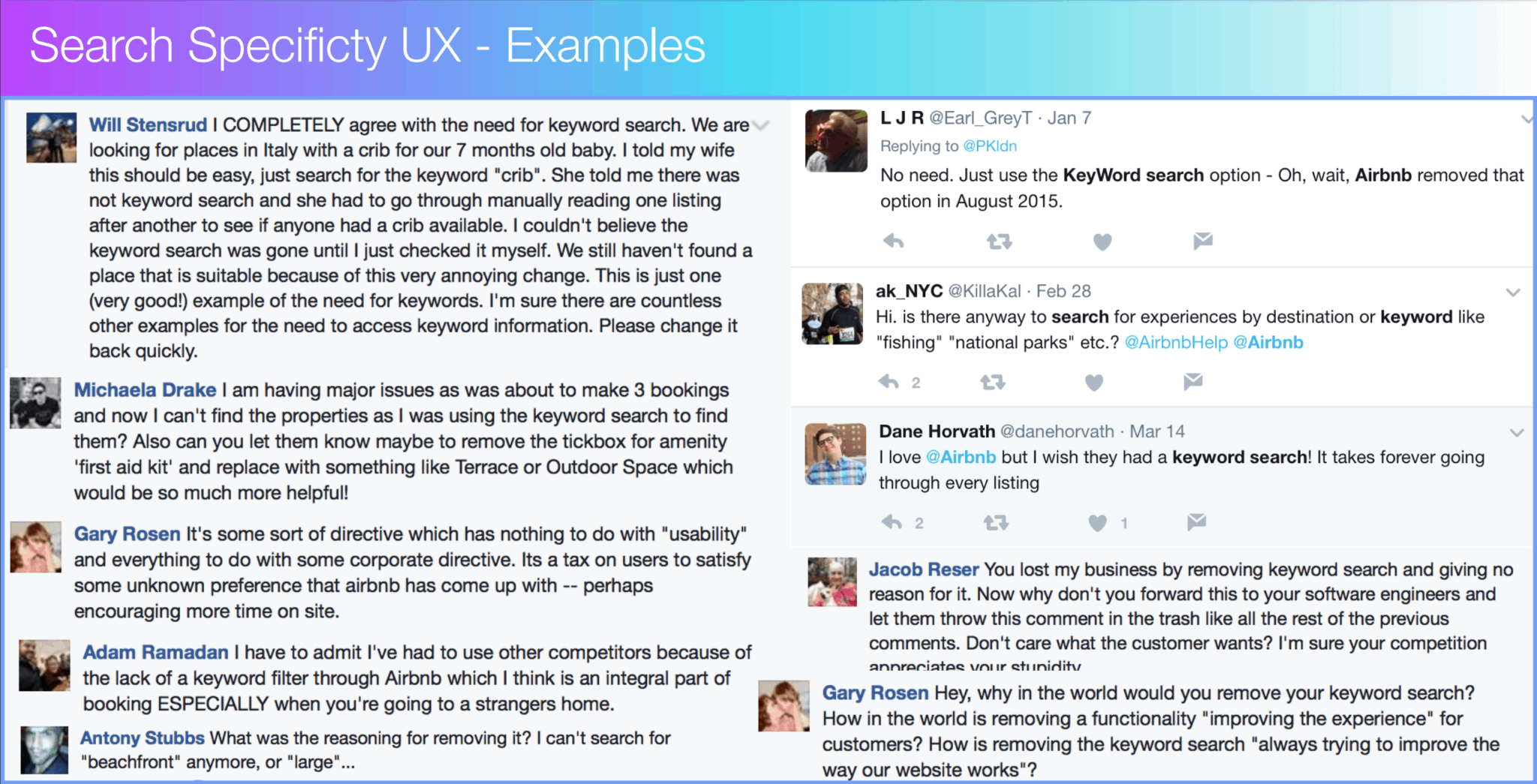
Then she followed up with everyone she'd emailed before. A few days later, she was sitting in their offices for an interview. Shortly after that, she was hired!
VVPs like this are incredibly effective because they allow you to:
- Prove out your value in a tangible way (as opposed to relying on a bullet in your resume)
- Show your enthusiasm for the company and solving its problems
- Go above and beyond – no other candidates are doing stuff like this
When your phone interview is over and your thank you email is sent, you can focus on using the information you've gained so far to build out a VVP.
Once it's ready, you can send it to the interviewer and say, “Thanks so much again for your time last week. I've been thinking a lot about [topic that relates to your VVP] so I went ahead and put together some ideas. They're attached here! If you have a second to take a look, I'd love to get your feedback.”
If your phone interview went well, this will be the icing on the cake. If there was a doubt in the interviewer's mind, this should help you overcome it and land a spot in the next round!




































